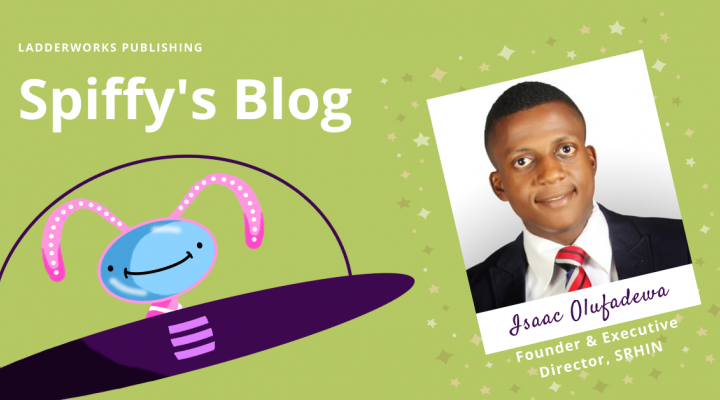Isaac Olufadewa: Raising the Bar on Community Health in Africa

Hi everyone, my name is Spiffy! I’m an interplanetary journalist talking to the geniuses making the world a healthier place. Today I’m in Nigeria after a quick suborbital flight to talk with Isaac Olufadewa, a doctor who has turned his attention to broader systemic issues.
Spiffy: Howdy Isaac, what challenge are you working on these days?
Isaac: Hi Spiffy! I work to promote equitable access to healthcare information and services in historically marginalized communities such as hard-to-reach rural communities, urban slums, and internally displaced persons (IDP) camps in Africa. My initiative shatters cultural, religious, and social barriers that prevent young people from accessing comprehensive sexual and mental health information and services. By providing health education, we are reducing the rate of unwanted pregnancies, unsafe abortion, substance abuse, and untimely deaths, especially among young people.
Spiffy: And what motivated you to address this challenge?
Isaac: I lived in a rural community for over two decades where the nearest quality healthcare center was over 3 kilometers away. There were several unwanted pregnancies, unsafe abortions, drug abuse among others in my community due to lack of health education. Having experienced first-hand the challenges that people in these underserved communities face in accessing healthcare information and services, I founded the Slum and Rural Health Initiative (SRHIN) to change the sad narrative about healthcare delivery especially for young people living in remote communities in Nigeria. It is easy to hurl complain and criticize policymakers, but what our world needs more than ever is those that take action.
 Photo courtesy of Isaac Olufadewa.
Photo courtesy of Isaac Olufadewa.
Spiffy: Well I’ll say, you’re using what you learned in your personal experience! And how does SHRIN make the world a more equitable place?
Isaac: Slum and Rural Health Initiative is improving access to healthcare information and services in many marginalized communities such as refugee camps and remote communities in Nigeria. We are delivering quality healthcare through various community health outreaches, school outreaches, media advocacy events among others. We leverage the power of technology and new media in democratizing evidence-based health information. Hence, we launched SimbiHealth, our mobile application, and chatbot this year.
Spiffy: But how does technology help healthcare? Isn’t the solution just to provide more accessible doctors?
Isaac: You do not need to be a nurse, doctor, or a laboratory scientist to be a health advocate, you can 'code' for health, 'design' for health, 'write' for health, or even share evidence-based health information among others to join healthcare practitioners in promoting healthcare in your community!
Spiffy: Neato! Even with a community effort, you must have a lot on your hands with everything going on, what’s a milestone you’ve reached recently?
Isaac: In April 2020, we (SRHIN) translated evidence-based COVID-19 Prevention messages from the World Health Organization (WHO) into over 100 languages (available at tinyurl.com/stopcovid) which have been shared on various social media and WhatsApp platform reaching millions of people in underserved communities in Africa in the process. In March 2020, we also launched SimbiHealth, Africa's flagship artificial intelligence-powered chatbot and application on sexual, mental, and social/NCD health.
Spiffy: What’s a time you’ve faced failure and didn’t give up? How did you learn from the experience?
Isaac: I remember failing to win a public speaking event twice when I was still studying medicine at Nigeria's Premier University (the University of Ibadan). The judges provided feedback during the first time that I failed but I did not work on them. Consequently, the second failure happened. To prevent the situation from happening the third time, I hired a classmate and a speech coach who both assisted me in improving my eloquence and body language. My investment paid off! I won the oratory competition on my third attempt. I learned the importance of working on feedbacks and constant improvement in the process.
Spiffy: I'm super curious. Have you learned anything surprising lately?
Isaac: I recently unexpectedly learnt from my 12-year-old cousin that one of the easiest ways to 'get a favor' from her parent is to be very nice to her so that she can put in a good word with them. I laughed about it when I heard it from her, however, it is true. That is why many international brands influence children who will persuade their parents to buy their products.
Spiffy: Your cousin sure is sharp!
Isaac is a medical doctor, author, and social entrepreneur with over 7 years of experience in the healthcare, leadership, and public policy sector. He is the Founder/Executive Director of Slum and Rural Health Initiative, an NGO that promotes quality healthcare to underserved communities, and the One Young World Managing Ambassador for Africa and the Middle East. (Nominated by One Young World)


